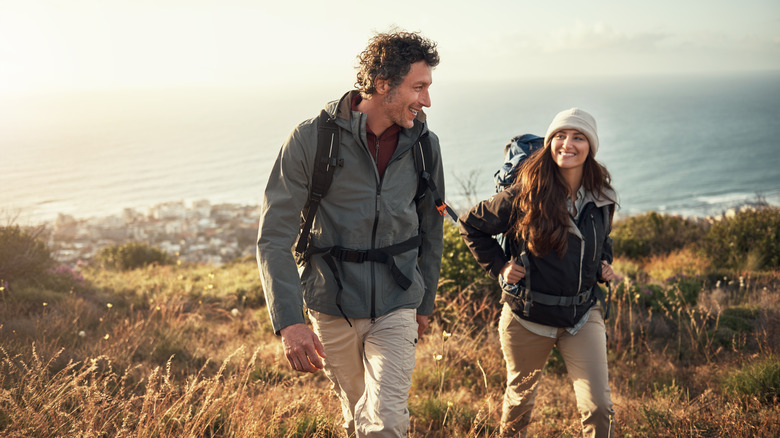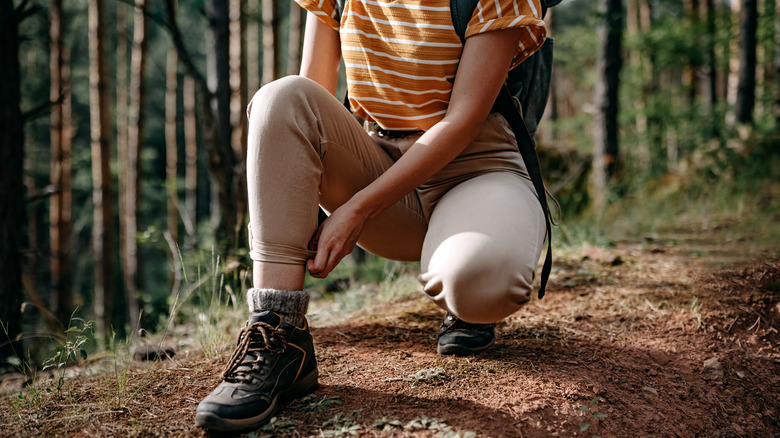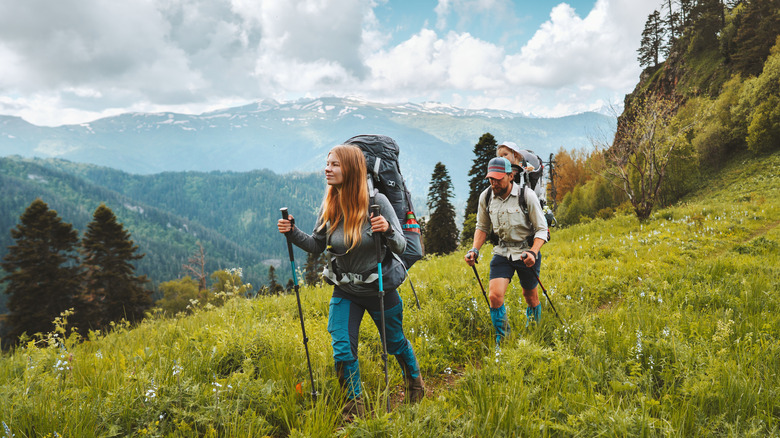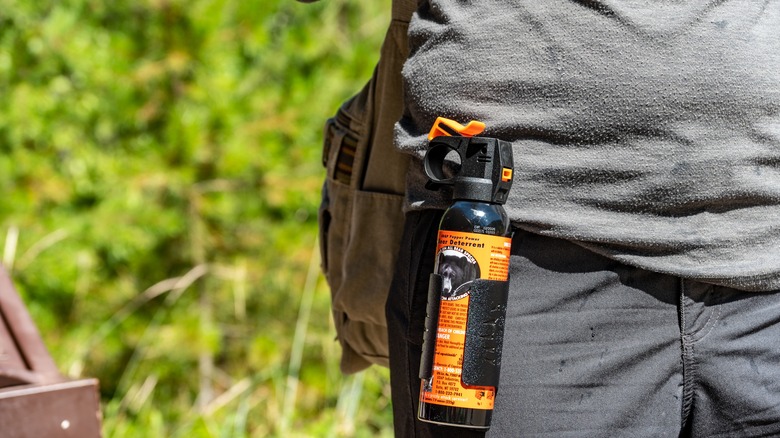Simple Steps To Take To Prepare Yourself For A Long-Distance Hike
Hiking is a beautiful way to get your exercise in. You're out in nature, seeing the sun and scenery. You get to watch birds and other wildlife and feel like you're a part of something bigger than yourself. If you love it, you may be considering a long hike. We're not talking about merely a full day here — we're talking about one that spans multiple days or even weeks. That sort of hike is a very different beast than a day in Los Angeles' Griffith Park. You must pack camping equipment, food, water, a first aid kit, and weather-specific gear.
Long hikes also take some physical and mental conditioning, and you don't want to go in unprepared. Obviously, planning your route, your mileage, looking at weather conditions, and deciding if you're ready to go alone or in a group is something you must consider beforehand. Once you have that stage done, however, there is some physical and mental preparation you have to do. Luckily we've got some simple steps you can take to make sure you're ready to hit the trail.
Types of exercise to work on
Doing a hike that lasts several days will tax your body if you're unprepared. Many of us can push through one day, but things will get harder once the soreness sets in a day or two later.
Aerobic exercise is really important — it involves your heart processing oxygenated blood for your muscles. Keeping your heart rate up for an extended period of time is something you have to get used to. The outlet suggests things like dancing, walking (at a good clip), spinning, and kickboxing to help get your stamina up. A study in Frontiers in Cardiovascular Medicine found that regular aerobic exercise can boost levels of genes that help in the creation and function of mitochondria, which Runner's World calls the "powerhouse of our cells that help generate energy for our muscles to use during exercise."
Resistance training is important as well. No, you're not hiking on your arms, of course, but you'll be lugging around a backpack with all your equipment. Bodyweight workouts like push-ups and pull-ups work well. Lunges are also important to prepare your leg muscles for hills and mountains. It's also worth doing some practice hiking with a weighted rucksack around the same weight as what you'll carry on your travels.
Practice with the items you're bringing with you
Having the right gear is important and very specific to the length of your journey, the weather conditions, the accessibility of resources, and whether you're going alone or with a group. Planning that part of things is vital to your success, and practicing with your gear is really important if you're newer to long hikes.
In addition to practice hikes in your boots, poles, and weighted backpack, you need to be able to know how to set up a tent (if you have one), use your cooking gear, close "dry bags" (to keep your important gear from water damage), open the bear repellant, etc. You're not going to want to read the instructions to set up your tent if it's pouring rain or you're behind on your miles and it's dark. This sort of practice can make your hike more enjoyable and keep you safe while doing it. You also want to ensure you know where your first aid kit is and that you can get to it easily and use everything in it when you're distracted by an emergency. It's even worth trying to go for a couple of days eating and drinking what you'll likely have access to on the trail.
Shorter hikes in similar conditions
Another simple way to prepare yourself is to take practice hikes in similar conditions to where you're going. For instance, if you're hiking in Hawaii, you should be practicing in rain and shine, as well as high humidity and heat (or cold, depending on the elevation). If you're heading to the mountains, high-elevation hikes similar to where you're traveling is important to get used to the different oxygen levels. Hiking in a rainy place? Do some longer hikes in the rain to get a feel for how your clothing and gear wear.
This is especially important in extreme weather hikes, where you'll be dealing with snow or intense heat. Being out in conditions like that for a few hours is one thing, but if you're going for days or weeks, you must give yourself time to feel the weather and prepare accordingly. It's better to come up against obstacles in practice so you know what to do. You can also choose a guided hike for your first one so you have an expert with you.
Better safe than sorry
We've all read stories about long hikes that went wrong. It's extra important to address and prepare for all possible safety hazards. Under no circumstances should you venture into the wilderness without letting someone know where you will be. Research the accessibility of cell phone service in your hiking destination and have check-in times with your contacts back home. You absolutely need to pack extra chargers for emergencies and make sure they're full. If you happen to hit civilization during your hike, it's worth recharging everything you can. Keep your phone locator on as well — just in case — and let people know that you have.
Safety equipment is a must. Again, practice with all of it. The time to read the instructions for your bear deterrent is not while you're looking said bear in the eyes. Know where your water sources are and what time of year they tend to dry up. You should also make sure to look at what sort of wildlife and dangerous plants you're likely to encounter, and any food stored and discarded should be out of reach (and smell). Finally, if you plan to listen to podcasts or music, keep your earphones low or have one earpiece out so you can be completely aware of your surroundings.
Bulk up those mental muscles
Half of your journey is going to take place in your head. You might be alone for a long time, or if you're going with a group, these people will be your only human interaction. Reminding yourself of that before you go and practicing a little conflict resolution or meditation will be really helpful. This won't be easy, but the sense of accomplishment is like nothing else. In the weeks beforehand, practice taking any obstacles one step at a time — because that's how you'll have to deal with them out in the wilderness.
Little things like bug bites, blisters, rain, snow, dirt, and loneliness will come up. There will also be joy, beauty, and a sense of being a part of something bigger. Remind yourself of the second part as you deal with the first. One really great way to prepare is with yin yoga classes, which have you holding poses for a long time. It allows you to confront how you approach and overcome obstacles and also helps build your muscular stamina. Safe journey!





